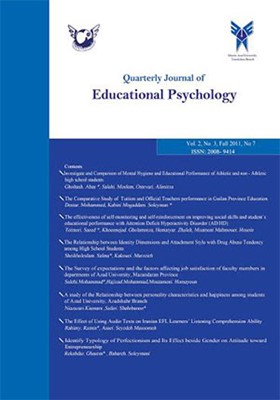The effectiveness of mindfulness-based cognitive therapy on Difficulties in emotion regulation and obsessive- rumination component in diabetes 2
Subject Areas : Journal of Educational PsychologyEbrahim Ghanbari 1 , Fatemeh Shahabizadeh 2 *
1 - M.A. Clinical Psychology, Islamic Azad University, Birjand Branch, Birjand, Iran
2 - Dept. of Psychology, Birjand Branch, Islamic Azad University, Birjand, Iran
Keywords: difficulties in emotion regulation, mindfulness-based cognitive therapy, type II diabetes, Ruminating,
Abstract :
Type II diabetes is an important public health problem that has a massive impact on individual and social functions of individuals. The present study was aimed at the effectiveness of mindfulness-based cognitive therapy on Difficulties emotion regulation and obsessive- rumination component in diabetes 2. The present study was a semi-experimental pretest-posttest design. The statistical population of all women and men with type 2 diabetes referred to health centers of Birjand in the last 3 months of 1395 (100 people). To collect data, a sample of 30 people was selected using available sampling method. The tools used were: Gratz and Romer's (2004) Difficulties emotion regulation (2004), and Nalen-Huxma and Marrow's Rumination Scale (1991). For data analysis, variance and multivariate covariance analysis were used. The findings showed that the mean of the experimental group in the stress components of emotional regulation (p < 0/05) and rumination (p < 0/01) decreased compared to the control group. The results of the study show the importance of mindfulness-based cognitive therapy intervention in improving the life of diabetic patients.
_||_

